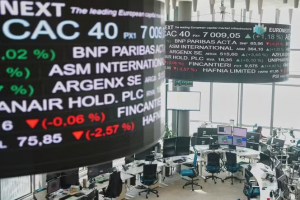The Dow Jones Industrial Average (DJIA) closed above the key 40,000 level for the first time in history on Friday, rising 134.21 points, or 0.34%, to 40,003.59, after hitting an intraday high in the previous session.
The S&P 500 inched up 6.17 points, or 0.12%, to 5,303.27, while the Nasdaq Composite ended down 12.35 points, or 0.07%, at 16,685.97.
The week ended strong with the Dow up 1.2%, marking its fifth straight weekly gain. The S&P 500 and Nasdaq climbed 1.5% and 2.1% week-to-date, achieving their longest winning streak since February.
This weekly ascent propelled the three indexes into positive territory for the second quarter despite a tough start. The S&P 500 and Nasdaq are now both up more than 11% in 2024, while the Dow has climbed more than 6% this year.
For the week ahead, key economic data releases include the existing home sales report on Wednesday, and the durable goods orders report along with the University of Michigan report on Friday.
Moreover, the minutes from the May Federal Open Market Committee (FOMC) meeting will be released on Wednesday. Meanwhile, several Fed officials are set to speak throughout the week as well.
“We expect the University of Michigan consumer sentiment index increased to 67.9 in the final May reading,” Goldman Sachs economists said in a Sunday note.
“We estimate the report’s measure of long-term inflation expectations remained unchanged at 3.1%, somewhat above the recent trend, reflecting higher gasoline prices and the higher-than-expected price data reported in 2024,” they added.
Investors await Nvidia, Target earnings reports So far, roughly 93% of the companies in the S&P 500 index have reported their latest earnings, with profits proving more resilient than expected.
Overall earnings are up 5.3%, supported by 3.7% revenue growth. Initially, bottom-up estimates had predicted a 3.9% rise in earnings from the previous year. Eight of the 11 sectors are showing positive earnings growth, six of which have witnessed double-digit increases.
As earnings season winds down, 17 firms are slated to report results this week, followed by another nine the following week.
By far the most anticipated report for this week will be released by NVIDIA Corporation (NASDAQ:NVDA), with Wall Street expecting another strong display from the AI darling.
Other prints that will be in the spotlight include Target, Toll Brothers (NYSE:TOL), Palo Alto Networks (NASDAQ:PANW), Snowflake (NYSE:SNOW), and Lowe’s (NYSE:LOW), among others.
What analysts are saying about US stocks Oppenheimer: “We remain positive on equities and continue to see fixed income securities as complimentary to stocks in providing portfolio diversification.”
“Some near term profit-taking in the day to day action of the market particularly in segments of the market that have had exceptional run-ups since last year into this year continues to appear to us quite normal.”
“Such activity combined with a process of rebalancing and rotation into other segments of the stock market in our view can be healthy and should contribute to the broadening of the markets’ progress from last year through this year.”
“Near term volatility could in our view continue to present opportunity for investors to “catch babies that get thrown out with the bath water” in periods of market down drafts as the market digests levels of uncertainty that are not uncommon to times of transition in monetary policy like these and in periods of rising geopolitical risk.”
BTIG: “The SPX is coming off four straight up weeks to fresh all-time highs. There are some negative divergences suggesting some consolidation is likely, but clearly the trend remains firmly bullish. The negative momentum and breadth divergences are also accompanied by an increase in speculation as Thursday was the highest Nasdaq Composite volume on record, driven by sub-$1 stocks. The equity put/call ratio is also back to complacent levels.”
“All of this suggests a shallow pause/pullback over coming weeks rather than something more long-lasting. The bigger story, in our view, is the recent breakouts in China and many commodities (gold, silver, copper, uranium, etc) as well as the related equities."
“We think this 'great reflation' trade has more to go and would highlight energy stocks as particularly timely here after a multi-week pullback.”
Morgan Stanley: “In the base case, we forecast a 19x P/E multiple on 12-month forward EPS (June 2026) of US$283, which equates to a 5,400 forward 12-month price target.”
“Our 2024 and 2025 earnings growth forecasts (8% and 13%, respectively) assume healthy, mid- single-digit top-line growth in addition to margin expansion in both years as positive operating leverage resumes (particularly in 2025). Modest valuation compression (from ~20x to ~19x in the base case) as earnings adjust higher is typical in a mid-to-late-cycle backdrop (occurred in the mid-1990s, mid- 2000s, and 2018 most recently).”
“Normalization in the market multiple is also a function of a higher risk premium (lower rates are a partial offset), which reflects uncertainty around a wider range of potential outcomes. On this front, our bull (6,350) and bear (4,200) cases represent ~20% upside and downside potential versus the current index level, respectively.”
Evercore ISI: “With VIX low at 11.99 while SPX trades at a very lofty 23.5x LTM P/E, all eyes turn to NVDA. If results beat consensus expectations, the near term share price reaction will be more difficult to gauge, even as the long term productivity implications of the AI Revolution remain clear. A +/- 8% move priced by Options is complicated by a downtick in AI uptake, falling to 4.7% – a “kink in the curve” to EVR ISI’s base case of 25% AI adoption by year-end 2025."
“One certain thing is that NVDA’s price reaction will have consequences for SPX as a whole. It always does.”













